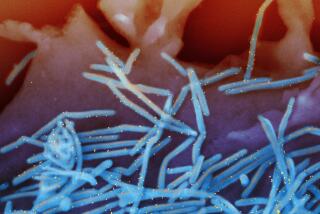FDA Approves 1st Large Testing of AIDS Vaccine
- Share via
WASHINGTON — A California company has received permission from the Food and Drug Administration to conduct the world’s first large-scale test of an AIDS vaccine, and company officials said Wednesday they would start offering the vaccine to thousands of healthy U.S. volunteers later this month.
The go-ahead represents a major turning point in the agonizingly difficult, decade-long effort to develop and test a vaccine against AIDS. Of the dozens of other experimental AIDS vaccines developed over the years, none has ever been deemed worthy of such a large, expensive, final test of efficacy.
Several experts cautioned, however, that the long-awaited milestone was not so much an endorsement of the vaccine’s potential effectiveness--which many believe is not especially great--as it is a sign of a change in strategy. Given the lack of certainty about what type of vaccine may work, many scientists now believe they must test several candidates in large trials rather than waiting for one standout to emerge from smaller tests.
“Even if it’s 100% negative results, learning that is worth doing the trial,” said Peggy Johnston, vice president for scientific affairs at the International AIDS Vaccine Initiative, a Washington-based nonprofit organization. “The only failed trial is one that gives no answers.”
Although new medicines have recently led to a decline in AIDS deaths, their long-term usefulness remains unknown and they are unaffordable to many--especially to those in developing countries, where 90% of the world’s new infections are occurring. For those reasons, public health officials agree that an effective vaccine is the only way to stop the epidemic.
Counterbalancing the urgency to find such a vaccine, however, is a concern that premature testing of candidate vaccines might interfere with success. It’s not easy to gather thousands of uninfected, at-risk people for inclusion in such trials, and scientists don’t want to deplete that pool before the best vaccines come along. Researchers also worry that volunteers getting less-than-perfect vaccines--or getting placebos--may wrongly assume they are protected and so may increase their risk-taking behaviors and foster the spread of the AIDS virus, HIV.
The AIDSVAX vaccine, made by VaxGen of South San Francisco, is to be tested in 5,000 gay men currently uninfected with HIV, and in heterosexual couples with one infected partner. Two-thirds of the volunteers will get injections of the vaccine every six months for three years and one-third will get shots of an inactive placebo. Although all volunteers will get training in safe sex and other ways to avoid becoming infected with HIV, it is expected that some individuals will periodically put themselves at risk and become infected.
At the end of three years, researchers and volunteers will learn for the first time who got the real vaccine and who got dummy shots. It is hoped, said VaxGen President Donald Francis, that the number of new infections will be far smaller in the vaccine group.
An FDA representative said the agency’s approval of the U.S. trial was based on evidence that the vaccine was safe and was not an indication of the agency’s confidence that the vaccine will work, a question that can only be answered in large-scale tests like these. The agency is now considering a request by the company to conduct similar tests in Thailand.
Francis said he was confident that the vaccine would be at least somewhat effective. “The question,” he said, “is how effective.”






